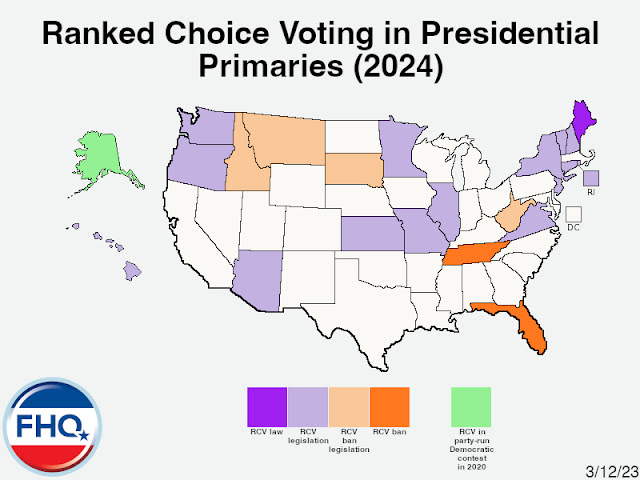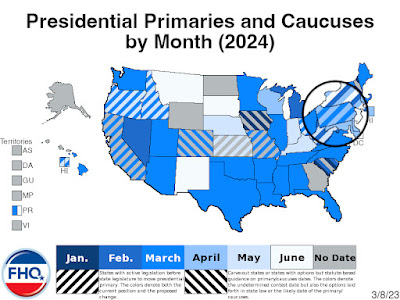Thoughts on the invisible primary and links to the goings on of the moment as 2024 approaches...
Ron DeSantis staked out a position yesterday on the Ukraine war, calling it "not a key US interest." That places him closer to Donald Trump's position on the issue than other Republicans officially in the race or seemingly running for the 2024 Republican presidential nomination. This is not an insignificant part of the invisible primary. In a battle among participants with the same letter (R) next to their names, carving out a differentiated, if not unique, position can be important as candidates jockey for support among the primary electorate.
But something Maggie Haberman of the New York Times tweeted in the context of this story highlighted a continued misunderstanding about the progression of the invisible primary:
And after avoiding talking about foreign policy for weeks, including at the Reagan Library in any expansive way, DeSantis weighing in is tantamount to acknowledging his presidential campaign is in the offing
A presidential candidacy is very much about the rollout and the announcement. Those things matter. But DeSantis weighing in on Ukraine is not "tantamount to acknowledging his presidential campaign is in the offing." It is not. Not in and of itself anyway. Now, that is not to say that the Florida governor's candidacy is not in this gray area between a lot of people, elite Republicans, media folks and otherwise, saying he is running (or will run) and a formal announcement. It is. And this Ukraine position is another datapoint in that gray area. But it is one datapoint among many -- travel, a warchest busting at the seams, meaningful donors lining up behind him, etc. -- that all point in basically the same direction: DeSantis is running. He is running and has been running for the 2024 Republican nomination. And he is very well positioned because of polling (to this point) and all the other relevant metrics mentioned above to be running in 2024 as well.
There is no need to dance around that reality. That is how it works.
...
The Trump campaign suggested that it is actively hiring a campaign team "especially in these early states," but has not shown the staff primary goods outside of a previously announced Iowa leadership team. It is a foregone conclusion that Trump will not be in the dominant position he was in four years ago as an incumbent president seeking nomination, but the question remains -- and it is an important one -- where he and his campaign are on the spectrum that runs from 2019-20 on the very prepared/organized/disciplined scale on the high end to 2015-16 on the low end. He was able to pull out the 2016 nomination despite being on the low side of that scale, but 2023-24 is not 2015-16.
...
California Republicans held their spring state convention over the weekend. The delegates in attendance were still very Trump-favorable. That matters. It matters because those delegates are potentially in a pool of possible national convention delegates in 2024. It matters because these conventions will decide on the rules of the delegate allocation/selection process for the 2024 cycle at the state level. And while much of the attention at these gatherings this winter/spring has been on the chair elections -- whether they are skeptical of the 2020 election results or not -- some attention should be paid to the rules for 2024. This is when those decisions are being made. And for the record, California Republicans made no changes to their national convention delegate allocation/selection process at this most recent state convention.
...
On this date...
...in 1972, George Wallace won a lopsided plurality in the Florida presidential primary, his first of six primary wins that cycle.
...in 1984, George McGovern pulled out of the race for the Democratic nomination, the day after Super Tuesday.
...in 1996, Steve Forbes withdrew from the Republican presidential nomination race, the last major challenger to Bob Dole to drop out during primary season. Pat Buchanan held out until the national convention. Both Forbes and Buchanan saw early success, winning a combined six contests, but nothing after March 9.
...in 2000, a cluster of six southern states, the remnants of the 1988 Southern Super Tuesday, held primaries, but were of little consequence in deciding the races. A frontloaded calendar meant that Super Tuesday a week earlier had already forced Bill Bradley and John McCain from their respective races, sealing the nominations for Al Gore and George W. Bush. Both Gore and Bush captured enough delegates on March 14, 2000 to become presumptive nominees.
...in 2008, the tapes of Jeremiah Wright's controversial comments on race resurfaced at the beginning of a long gap in the primary calendar before the Pennsylvania primary in late April.
...in 2019, Beto O'Rourke formally entered the race for the 2020 Democratic presidential nomination.
--
Recent posts:




